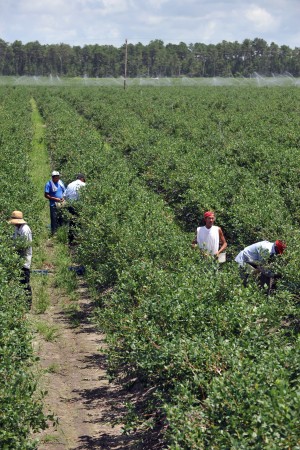Burlington’s Sakuma Brothers Farms told striking migrant workers that they must leave the premises today if they don’t want to work, according to a community organizer helping the workers. At a 6 a.m. meeting this morning, farm representatives also instructed striking workers to pick up their final paycheck tomorrow, says Rosalinda Guillen of the Bellingham organization Community to Community Development.
Guillen spoke to Seattle Weekly from the Sakuma camp, where some 240 workers and their families live in cabins provided by the berry farm. She and Jose Ortiz, a Catholic church outreach worker who is acting as a mediator between workers and the farm, and who also spoke to
SW from the camp, say no one is yet packing up.
“They’re not going to leave,” Guillen says. “These are people who drove up from California and paid $600 to get here. They haven’t even earned that money back.” Ortiz says workers, most of them Mexican immigrants, are spending the morning singing traditional songs, dancing and praying.
Sakuma has not yet returned a call this morning seeking comment.
The stand-off is the latest development in an unusual weeks-old conflict that taps into the national controversy about the federal guest worker program, which is again under review as Congress takes up immigration reform. As The Seattle Times
reported this morning, Sakuma is scheduled to bring in 160 guest workers from Mexico next month to supplement its workforce.
Critics of the guest worker program, known as the H-2A program, often contend that it leads to abuse and lower wages. Consider, for instance, this assessment from the Southern Poverty Law Center, in a report earlier this year entitled “Close to Slavery.”
The current H-2 program, which provides temporary farmworkers and non-farm laborers for a variety of U.S. industries, is rife with labor and human rights violations committed by employers who prey on a highly vulnerable workforce. It harms the interests of U.S. workers, as well, by undercutting wages and working conditions for those who labor at the lowest rungs of the economic ladder. This program should not be expanded or used as a model for immigration reform.
Yet Sakuma strikers express bitterness at what they say are the higher wages to be paid guest workers. They are to make $12 an hour, whereas existing workers are paid according to how much they pick, which they say often does not equal that amount. The farm says it does, according to the Times.
Regardless, the law requires that once guest workers arrive, all employees doing comparable work be brought up to $12-an-hour. But Guillen says strikers don’t trust that the company will fulfill that obligation. Also, she says the migrant workers want $14 an hour, a demand the company made clear this morning it is not willing to meet.
So what does this saga reveal about the guest worker program? “It’s complicated,” acknowledges Michele Besso, a lawyer with Northwest Justice Project, a legal aid program that has been providing striking workers with information about their rights.
One question she raises is why Sakuma didn’t simply raise its wages to get more local workers–a question that has added relevance if it’s true that the farm intends to pay its imported workers more. With guest workers, the farm incurs the added expense of flying everybody in. Those workers will be legal, however, something that is not the case with many immigrant farmworkers throughout the state.
Even so, the company is supposed to show that it has been unable to recruit local workers. And that process, monitored by the state’s WorkSource program, is still ongoing.
Burlington resident and community activist Hector Franco expresses doubt that the company really wants local workers. He says he himself applied for a farmworker position–”$12-an-hour is not bad”–and was given the “runaround.” In a complaint filed with WorkSource, he describes being sent by state and farm staff to different addresses, asked for a resume and told he had to go through a “preliminary screening”–a rather comical gauntlet for a job picking fruit.
A letter to Franco from Employment Security’s WorkSource regional director Greta Kaas-Lent, dated yesterday, says she is forwarding the complaint on to the federal Department of Labor.








